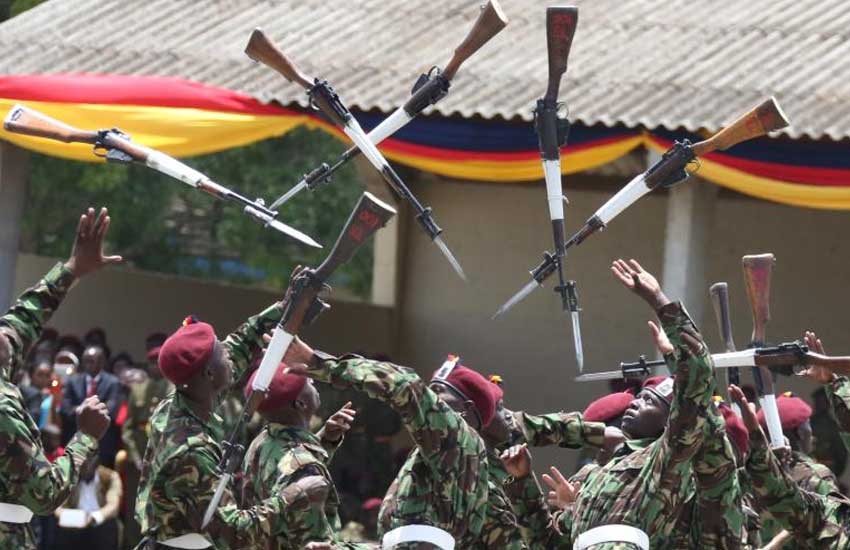
The Administration Police (AP) were called in droves to contain the masses during the visit of President Barack Obama to his ancestral home of Kogelo, Siaya County.
It is curious how the AP has grown from the colonial era when they were fleshed from the Tribal Police.
Initially, they began as Native Police, protecting and reporting to the Headman in rural Kenya after enactment of the Village Headman Ordinance designed to bring locals into the money economy, enforce tax payment and movement of people and livestock around 1902.
The Headman and the Native Police, most of them village mang’aas and bullies, enforced rules and kept law and order.
But come 1929, they were formalised as the Tribal Police, with mandatory training from Regional Agents, as District Commissioners were then called, most of whom had military background.
The Tribal Police operated unarmed in rural areas until the State of Emergency was declared in October 1952, necessitating their arming.
The Tribal Police worked hand in hand with the colonial forces in containing the Mau Mau insurgency at the height of the Emergency in 1952.
Crashing the Mau Mau was no easy walk into Mt Kenya and Aberdare forests, where some 20,000 ‘soldiers’ scurried mountain ranges with homemade guns and intricate knowledge of their terrain, from where they employed nocturnal ‘surprise-attack’ tactics, interspersed with high-profile murders.
The Tribal Police was thus strengthened as part of the 22,000-strong colonial force composed of the King’s African Rifles, the British Regiment of white military personnel, the Kenya Regiment of volunteer settlers, the Kenya Police and the Loyalists or Home Guards who were the “trained forces of local resistance.”
The Home Guards - hated and corruptly called ngati - were from the Tribal Police and private guards, watching over the equally-hated chiefs who needed round-the-clock protection in Kikuyu, Meru and Embu regions.
They were trained by the Kenya Police and the Kenya Police Reserve units and tasked with “winkling” the Mau Mau “out and forcing them into the open,” since the British Army was “powerless without the aid of the local Africans with intimate knowledge of the terrain,” notes The History of the Loyalists, a book released by the colonial government.
The Home Guards were carefully screened to ensure none had taken Mau Mau oath. Turncoats were required to either take loyalty oath, cleansing oath or publicly denounce the Mau Mau to eliminate infiltrating the Home Guards with informants.
Home Guards were thus recruited by a selection board consisting of colonial government officials, chiefs, Christians and Tribal Police. Entry was by invitation in what was a “slow, tedious and often heart-breaking work“ that took weeks to grow from three to 12 and 50 to 200 Home Guards in an area.
The Ameru were the easiest to recruit as “the tribe had loyal elements” and the Njuri Ncheke endorsed recruits from the Nthaka warrior class.
“The Mau Mau were defeated and finally thrown out by the tribesmen themselves” since the Home Guards eventually helped the colonial forces to crash the “small robber gangs” that was the Mau Mau.
Tribal Police morphed into the Administration Police in 1958 and their role changed to protecting government buildings and VIPs.
The Home Guards became part of the Kenya Police Reserve which had been formed in 1948, with armed settlers as the majority. Although it was open to all races, it was only functioning in “undisturbed” areas. It was disbanded in 2004 but still operates in rural and remote areas of Kenya.
Did you know that the General Service Unit (GSU) was initially called Emergency Company? It was established by the colonial government as the Kenya Police Emergency Company - the paramilitary wing of the police.
It was renamed the General Service Unit to deal with the Mau Mau insurgency in September 1953 and today, still deals with emergency situations. The Israel-trained Recce Squad is the best known unit within GSU.
 The Standard Group Plc is a multi-media organization with investments in media
platforms spanning newspaper print
operations, television, radio broadcasting, digital and online services. The
Standard Group is recognized as a
leading multi-media house in Kenya with a key influence in matters of national and
international interest.
The Standard Group Plc is a multi-media organization with investments in media
platforms spanning newspaper print
operations, television, radio broadcasting, digital and online services. The
Standard Group is recognized as a
leading multi-media house in Kenya with a key influence in matters of national and
international interest.
